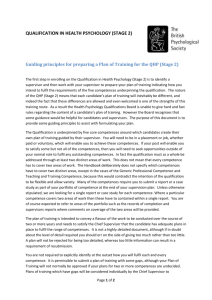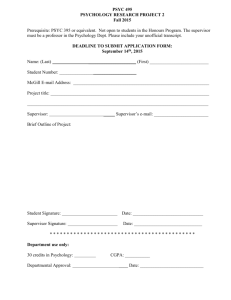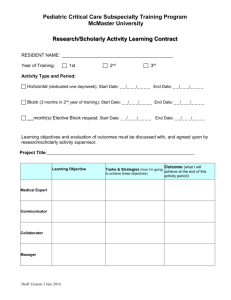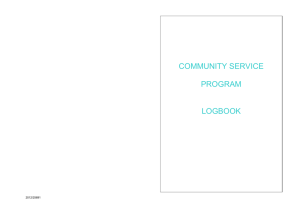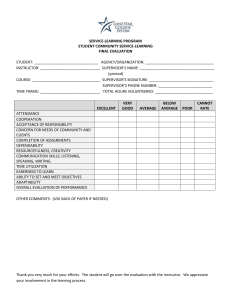Frequently asked questions for prospective candidates
advertisement
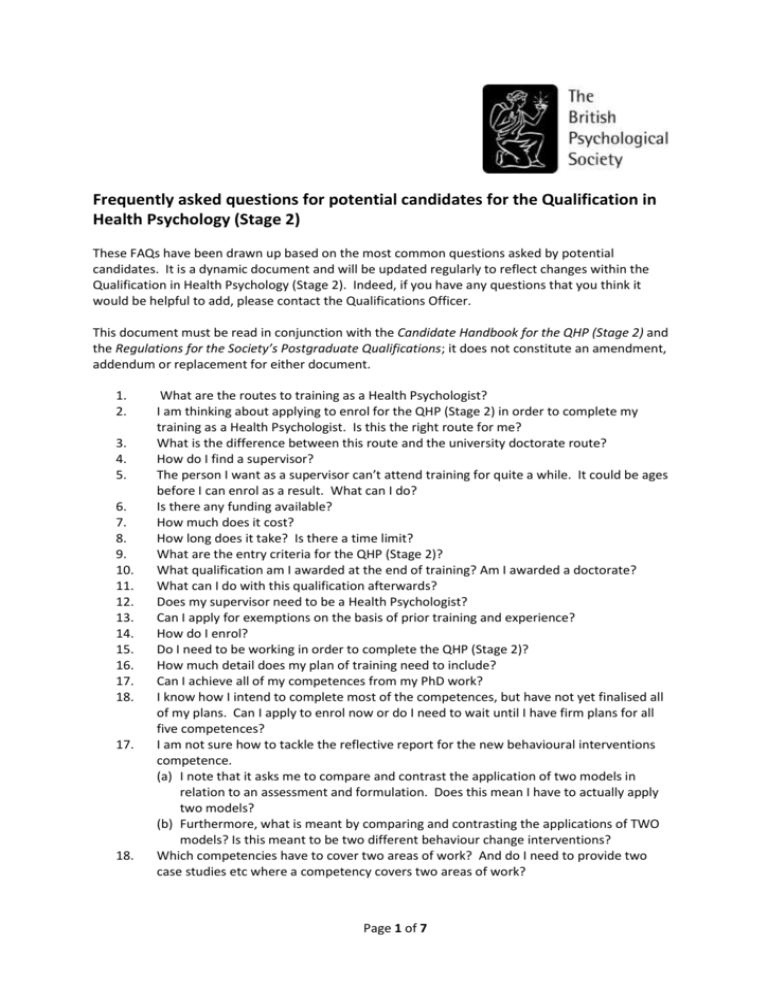
Frequently asked questions for potential candidates for the Qualification in Health Psychology (Stage 2) These FAQs have been drawn up based on the most common questions asked by potential candidates. It is a dynamic document and will be updated regularly to reflect changes within the Qualification in Health Psychology (Stage 2). Indeed, if you have any questions that you think it would be helpful to add, please contact the Qualifications Officer. This document must be read in conjunction with the Candidate Handbook for the QHP (Stage 2) and the Regulations for the Society’s Postgraduate Qualifications; it does not constitute an amendment, addendum or replacement for either document. 1. 2. 3. 4. 5. 6. 7. 8. 9. 10. 11. 12. 13. 14. 15. 16. 17. 18. 17. 18. What are the routes to training as a Health Psychologist? I am thinking about applying to enrol for the QHP (Stage 2) in order to complete my training as a Health Psychologist. Is this the right route for me? What is the difference between this route and the university doctorate route? How do I find a supervisor? The person I want as a supervisor can’t attend training for quite a while. It could be ages before I can enrol as a result. What can I do? Is there any funding available? How much does it cost? How long does it take? Is there a time limit? What are the entry criteria for the QHP (Stage 2)? What qualification am I awarded at the end of training? Am I awarded a doctorate? What can I do with this qualification afterwards? Does my supervisor need to be a Health Psychologist? Can I apply for exemptions on the basis of prior training and experience? How do I enrol? Do I need to be working in order to complete the QHP (Stage 2)? How much detail does my plan of training need to include? Can I achieve all of my competences from my PhD work? I know how I intend to complete most of the competences, but have not yet finalised all of my plans. Can I apply to enrol now or do I need to wait until I have firm plans for all five competences? I am not sure how to tackle the reflective report for the new behavioural interventions competence. (a) I note that it asks me to compare and contrast the application of two models in relation to an assessment and formulation. Does this mean I have to actually apply two models? (b) Furthermore, what is meant by comparing and contrasting the applications of TWO models? Is this meant to be two different behaviour change interventions? Which competencies have to cover two areas of work? And do I need to provide two case studies etc where a competency covers two areas of work? Page 1 of 7 19. 20. 1. I am in the process of drawing up my plans for the consultancy competence. What exactly constitutes consultancy? Can I complete the qualification and remain in my current job? What are the routes to training as a Health Psychologist? The main route to training as a Health Psychologist is as follows: i) ii) Completion of stage 1 training via a Society-accredited Masters programme in health psychology; Followed by completion of Stage 2 training in health psychology, either via the Society’s Stage 2 qualification (sometimes referred to as the “independent route”) or via a Society-accredited Stage 2 training based at a university. By following this route, then at the end of training you would be eligible for Chartered Membership of the Society and Full membership of the Division of Health Psychology, and eligible to apply to the Health Professions Council (HPC) for registration as a Health Psychologist. The title of Health Psychologist is a legally protected title and you need to be registered as such with the HPC in order to use the title. It may be possible to register with the HPC as a Health Psychologist by undertaking a different training route. For further details about the full range of training routes which confer eligibility to apply for registration with the HPC, please contact the HPC. Please note that some routes leading to HPC registration will not lead to eligibility for Chartered Membership of the Society or Full membership of the Division of Health Psychology. In order to ensure that you are eligible for these grades of membership when you have completed your training please ensure that you follow a Societyaccredited training route. If you have any queries in this regard please contact the Qualifications Office. 2. I am thinking about applying to enrol for the QHP (Stage 2) in order to complete my training as a Health Psychologist. Is this the right route for me? The QHP (Stage 2) is often chosen as the preferred route of training by those who cannot attend a HPC-approved doctorate programme in health psychology (based at a university) as a result of personal or financial commitments. The flexible structure of the QHP (Stage 2) can allow candidates to fit their training around their existing commitments (such as a family or a job) more easily than can sometimes be done with taught programmes. It can also be the favoured route for those who enjoy having flexibility and control over the way in which they train. Rather than being a course of study in the traditional sense, the Qualification is underpinned by five core competences around which trainees create their own plan of training, guided of course by their supervisor. This means that the QHP (Stage 2) requires candidates to be independent learners who are capable of and comfortable with taking control of their training and development. Some people thrive in this type of environment, while others prefer to be part of a cohort within a more traditional educational setting. If you identify more with the latter, then you may wish to explore an approved university doctorate programme in health psychology. Page 2 of 7 2. What is the difference between this route and the university doctorate route? In terms of the end-point qualification, there is no difference, in that the whole purpose is to achieve eligibility to apply to the Health Professions Council for registration as a Health Psychologist and to apply to the Society for Chartered Membership. This route is relatively flexible and, by its very nature, individualistic. Costs associated with the various routes can differ, as can the nature of the work carried out, but ultimately the QHP (Stage 2) is competence based, and there are many ways to achieve a set of competences. Furthermore, the QHP (Stage 2) does not confer a title upon you (i.e. Dr), as in the case of Society-accredited and HPC-approved university doctorates, but for some candidates provides a degree of flexibility that sometimes other routes may not match. 3. How do I find a supervisor? Do they have to be in my local area? The Society has a Register of Applied Psychology Practice Supervisors available for trainees to use in order to find a suitable supervisor. The professional relationship between you and your supervisor is very important to your development on the qualification and so you may wish to contact more than one supervisor before making any decisions about who to work with. Your supervisor does not need to be located in your local area. So long as you are able to meet face-to-face at least six times per year, and at least four of these meetings are scheduled quarterly, then interim contact can be maintained via email and telephone. Advance bookings on rail and air travel can be very cheap, and so distance should not preclude someone from supervising you. 3. The person I want as a supervisor can’t attend training for quite a while. It could be ages before I can enrol as a result. What can I do? If your intended supervisor is hoping to undertake the training and become approved, but certain practicalities are delaying this, you can still move along with your plan of training, and get the process underway by finding a 'stop-gap supervisor' who will provide supervision until such a time as a change-over is feasible. However, you might find that very few approved supervisors are willing to undertake this unless they are very familiar with you and your work. 4. Is there any funding available? Unfortunately the Society is unable to fund candidates through the QHP (Stage 2). Most candidates are in paid employment while completing the qualification in order to pay for the costs incurred. Some candidates are able to secure some funding from their employer and you may wish to approach your line manage to see whether this is an option for you. 5. How much does it cost? The QHP (Stage 2) is a professional qualification, and in order to ensure that it runs smoothly the Society must charge candidates for services such as processing enrolment applications, maintaining records and assessing work. Details of the current fees can be downloaded from the QHP Downloads webpage. It is difficult to place a figure on the overall cost of completing the QHP (Stage 2) due to the individual nature of the route. You are advised to be realistic about the length of Page 3 of 7 time in which you intend to complete the qualification as this will directly affect the overall cost. QHP (Stage 2) fees carry the advantage that they are charged on a more piecemeal basis rather than in large lump sums, and for most candidates who complete the qualification within 2-3 years, it should cost less than completing a doctorate. Fees payable to the Society in relation to the QHP (Stage 2) are reviewed annually and are subject to increases in line with inflation and any rises in VAT. Your supervisor is likely to charge fees for their services. These fees are not set by the Society as this is a private arrangement between supervisor and supervisee. You are strongly recommended to discuss costs with your supervisor before signing a contract. 6. How long does it take? Is there a time limit? Candidates for the QHP (Stage 2) can complete the qualification in a minimum of 2 years. There is no time limit, but all candidates are expected to demonstrate progression via the quarterly development reviews (see the Candidate Handbook for further details). 7. What are the entry criteria? Am I allowed to submit an enrolment application? You must have the Graduate Basis for Chartered Membership of the Society, eligibility for which is obtained through successful completion of either a Society-accredited undergraduate honours degree in psychology, or via a Society-accredited conversion course for graduates of other disciplines. You must also have current Graduate Membership of the Society, and you must have completed stage 1 training in health psychology either via a Society-accredited Masters programme in health psychology, or the Society’s own Stage 1 qualification (now discontinued). The first step in enrolling is to identify a supervisor (see question 2) and then work with your supervisor to prepare your plan of training indicating how you intend to fulfil the requirements of the five competences underpinning the qualification. You may find that you need to go outside of your current employment setting to fulfil one or more competences and you should investigate means of doing this with your supervisor. 7. What qualification am I awarded at the end of training? Am I awarded a doctorate? Once you have satisfied the assessors on all requirements, you will be awarded the Qualification in Health Psychology (Stage 2). This confers eligibility to apply to the Society for Chartered Membership and Full Membership of the Division of Health Psychology, and also confers eligibility to apply to the Health Professions Council for registration as a Health Psychologist. The QHP (Stage 2) is a doctoral level qualification and incorporates the same syllabus as the approved university doctorate programmes. However, as the Society is not an awarding body, it is unable to confer the title of Doctor on successful candidates. 8. Does my supervisor need to be a Health Psychologist? Yes. Your supervisor must be a Chartered Psychologist, a full member of the Division of Health Psychology, and registered with the Health Professions Council as a Health Psychologist. They must also be entered onto the Society’s Register of Applied Psychology Practice Supervisors and must attend training specifically designed for the role before being approved. Page 4 of 7 9. What can I do with this qualification afterwards? Once qualified you are eligible to apply to the HPC for registration as a Health Psychologist, which is a legally protected title and allows you to practice in the UK as a Health Psychologist. You can effectively enjoy the same range of careers as any other similarly qualified individual, regardless of the route that they took to achieve this. You might find, however, that there are some residual biases by certain employers towards ‘hands-on practice’ or towards ‘academic merit’, which means of course that the different routes have slightly different advantages and disadvantages. This is not necessarily a property of the routes themselves, but of the expectations and preconceptions of certain employers. 10. Can I apply for exemptions on the basis of prior training and experience? Yes, there is a process by which you may apply for “accreditation of existing competence” (AEC) for up to two competences provided that the training and/or experience was undertaken after you were awarded your Stage 1 qualification in health psychology. You will also need to provide suitable evidence, as explained in the AEC form which is available to download from the QHP Downloads webpage. You are strongly advised to discuss with your supervisor whether you are in a position to apply for AEC for any of the competences. The onus is on you as the candidate to evidence your training and experience as clearly as possible in order for the enrolment assessor to make a decision regarding your application. If the Chief Supervisor cannot find clear evidence, you cannot be awarded the exemption! AEC fees are non-refundable if the application for AEC is not granted. 11. How do I enrol? How long does it take? The first step is to ensure that you meet the entry criteria as outlined in the Candidate Handbook. You must then find a supervisor and ensure that they appear on the Register of Applied Psychology Practice Supervisors and seek approval of your supervisor from the Chief Supervisor. You must then work closely with your supervisor to draw up your Plan of Training. This process can take longer than you think and should not be approached hastily. Once submitted, your enrolment application is assessed by the Chief Supervisor who then writes to you with the outcome of your application, usually within 6 weeks of submission. 12. Do I need to be working in order to complete the QHP (Stage 2)? You will need to be in a placement/job, whether paid or voluntary, which will enable you to fulfil the requirements of the qualification. If your position will enable you to satisfy some but not all of the competences, then you will need to seek opportunities outside of your normal role to fulfil any outstanding competences. 12. How much detail does my plan of training need to include? Your plan of training needs to satisfy the Chief Supervisor that you have adequate plans in place to fulfil the range of competences. You are not required to explicitly identify at the outset how you will fulfil each and every competence, but your Plan of Training will not normally be approved if your plans for two or more competences are undecided. If your Plan of Training is approved with any gaps, you will be required to submit a Plan of Training Revision form addressing these in the timeframe specified by the Chief Supervisor in the letter accepting the plan of training. Page 5 of 7 13. I know how I intend to complete most of the competences, but have not yet finalised all of my plans. Can I apply to enrol now or do I need to wait until I have firm plans for all five competences? It is permissible to submit a plan of training with some gaps, although a plan of training will not normally be approved if your plans for two or more competences are undecided. Plans of training which have gaps will be considered individually by the Chief Supervisor to determine whether the gaps are acceptable or not. If the plan cannot be accepted as presented, then you will be provided with detailed guidance about the areas which need to be addressed. If the plan is accepted with gaps, then you will need to address the gaps in the timeframe specified by the Chief Supervisor in the letter accepting your plan of training. 14. I am not sure how to tackle the reflective report for the new behavioural interventions competence. (a) I note that it asks me to compare and contrast the application of two models in relation to an assessment and formulation. Does this mean I have to actually apply two models? (b) Furthermore, what is meant by comparing and contrasting the applications of TWO models? Is this meant to be two different behaviour change interventions? (a) This is one of those things that can be interpreted a number of ways. The way it is literally written one could take it to mean that you have to apply two models in the intervention, or alternatively you could apply one model in the intervention, but compare it to another one in the write-up. It is safer to plan for the former. However, the model can mean practical or theoretical. It can mean health psychology models like HBM, or TPB, or it can also mean models of behaviour change. (b) It is important to note that models are not interventions. But, by discussing which intervention you use, you can deal with why the theory behind it works in this case, and why other models and interventions would not. It doesn't have to be more complicated than that. 15. Which competencies have to cover two areas of work? And do I need to provide two case studies etc where a competency covers two areas of work? The QHP (Stage 2) must as a whole be addressed through at least two distinct areas of work. This does not mean that every competence has to cover two areas of work. The Handbook deliberately does not specify which competences have to cover two distinct areas, except in the case of the Generic Professional Competence, because this would contradict the intention of the qualification to be flexible and allow variety. Unless otherwise stipulated, we are looking for a single report for each competence. Where the competence covers two areas of work then these have to contained within a single report. You are of course expected to refer to areas of the portfolio such as the records of completion and supervisors reports where comment on coverage of the two areas will be provided. 16. Can I achieve all of my competences from my PhD work? Page 6 of 7 This depends on what is meant by ‘PhD work’, and what the PhD actually involves. For most candidates, the answer is probably ‘no’, because PhDs are highly focused and would not necessarily involve complicated ethical approvals (such as is required under the Generic Professional Competence). Indeed, if all of your work involved text studies, there would probably be no ethical approval necessary at all. A PhD would not always necessitate a systematic review either, and not every PhD student engages in sufficient teaching to demonstrate that particular competence. However, many PhD candidates can achieve the competences from their PhD work and associated activities. 17. I am in the process of drawing up my plans for the consultancy competence. What exactly constitutes “consultancy”? Consultancy is, by definition, external, therefore any tasks that your line manager asks you to do are considered part of your job and therefore cannot be used towards the consultancy competence. It must be someone outside of your normal scope of work who asks you to undertake a particular task for the task to be considered consultancy. An exception to this rule might be if you are a self-employed consultant where consultancy is what you do for a living. 18. Can I complete the qualification and remain in my current job? Yes, so long as your current job will allow you to meet the requirements of the qualification. Some guidance on the sort of job that might be suitable can be found in section 4.2.5 of the Candidate Handbook. As the qualification must be completed as a whole in two areas of work, you will need to source a suitable opportunity external to your day-to-day work to meet this requirement. Page 7 of 7
